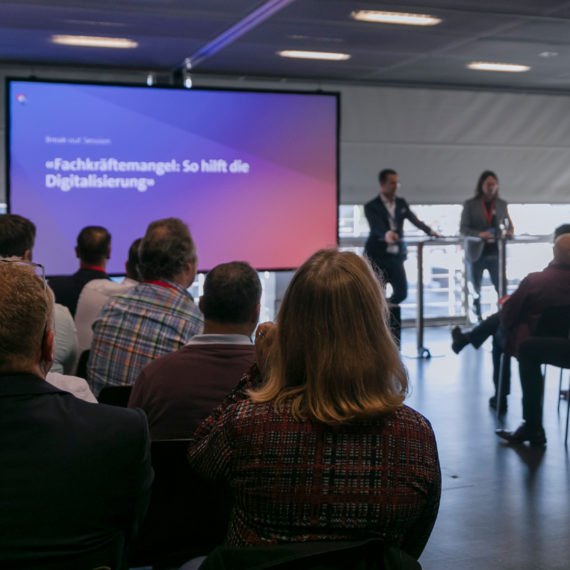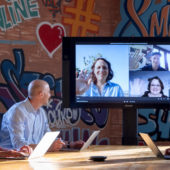The shortage of skilled workers is demanding completely new approaches from Swiss companies. Today, a work-life balance, a wide range of training opportunities and, last but not least, a modern workplace are minimum requirements.
In summer 2022, a psychologically important milestone was crossed in Switzerland: the number of vacancies exceeded 100,000 for the first time. To be precise, the Swiss economy was unable to fill 114,000 job positions in July 2022. The battle surrounding the shortage of skilled workers has thus become even more acute in recent months.
Not all sectors are affected to the same extent, and it is currently difficult to assess the long-term impact of the COVID-19 pandemic on the labour market. It is clear, however, that industries oriented towards manual labour need to be particularly well-prepared. It’s just as difficult to find engineers, nurses and IT specialists as it is to find tradespeople, as the 2021 Skills Shortage Index published by Adecco Switzerland shows.
Who will replace the boomers?
The reasons for the shortage of well-trained workers can be quickly identified. On the one hand, Switzerland is in the midst of a dramatic demographic change: the baby boomers – i.e., the post-war generation – are retiring. Around 800,000 people are expected to retire in the next ten years. There is a gap of hundreds of thousands to replace these departures. On the other hand, a generation is now entering the labour market that is confidently demanding more part-time work, greater flexibility and a healthy work-life balance.

For many companies, the question arises as to how they can even fill vacancies. And just as important: how they can retain their employees. Around half of employees are thinking about changing jobs. No less than 25% have actually done so since the start of the pandemic. Lucas Zehnder, a headhunter and consultant at Rockstar Recruiting, depends on this urge to change. But he puts it into perspective: ‘The issues that drive job seekers today are by no means new. A friendly environment and a positive, healthy corporate culture are at the top of the list of requirements. By the way, this was exactly the same even before large-scale digitalisation,’ emphasises Zehnder.
Advancement of women and continuing education

Patrick Minder, Head of Platforms & Applications at Swisscom and the boss of around 1,000 IT professionals, has a similar perspective. ‘Our most important task is to retain people.’ Minder points out what he believes to be particularly important: ‘Reconciling work and family life is particularly important for younger colleagues. As a company, we have to create the right conditions for this.’ An important part of this is having a modern workplace with the ability to work remotely and with seamless communication across multiple channels. Just as important is the continuing education offered by Swisscom: ‘My colleagues work in an environment that is changing dramatically. Even 50-year-olds wonder what they will do in five or ten years’ time and whether their expertise will be enough. That’s why we make every effort to keep these people up to date.’
Salary is not the most important thing
It has paid off: attrition in Patrick Minder’s department is less than 10%. ‘Up to 20% is normal in our industry.’ Especially in the IT sector, where even apprentices are often paid six-figure annual salaries – usually by large international companies. Accordingly, neither Patrick Minder nor Lucas Zehnder believe that a Swiss SME will be able to keep up with this financial competition. Zehnder emphasises that in these highly competitive professional fields, it’s primarily about nurturing the community: ‘I actually do nothing else all day.’ If the interpersonal aspect works well, then the financial aspect is often of secondary importance. This is what various job satisfaction surveys have shown: money is not the main motivation for many employees in Switzerland. Zehnder emphasises that this is completely independent of the age of the respondents. The younger generation loudly and confidently puts forward their demands, in particular for part-time work, meaningful work and a high quality of life.
A modern workplace is essential
‘Younger job seekers have a clear vision of what their workplace should look like today. If an employer can’t meet these requirements, they’re in a bad position when it comes to recruiting,’ says Zehnder. Ten years ago, people feared that digitalisation would destroy millions of jobs, but today the focus of discussion has completely shifted. ‘Digitalisation means that I have to do fewer boring tasks and can concentrate on the important things,’ emphasises Zehnder. Poorly digitalised processes, an outdated IT infrastructure and a lack of opportunities to work from anywhere not only kill efficiency, they also scare off new talent. ‘Applicants have very little patience with outdated IT workstations. In this case, your own infrastructure often sets the standard. This also enables flexibility in terms of the time and location that is required,’ notes Patrick Minder.
Rethinking older employees
Finally, both emphasise that the battle for younger talent can only solve part of the problem. The fact remains that the baby boomers will retire and leave a delicate gap. For this reason, says Minder, it is imperative to rethink how we deal with pensioners: ‘Many people are willing to work even after their 65th birthday, but not on the same terms anymore.’ However, this requires a high degree of flexibility on all sides. The salary system needs to be rethought, as does the handling of responsibility and the division of labour. But it’s worth it, says Minder: ‘If we can use new models to convince older people to stick around for a few more years, everyone wins. And why should we frivolously renounce the experience of these people?’
Tips to counter the shortage of skilled workers
- Continuing education: Invest in your existing workforce, not just in recruiting.
- Working environment: Maintain interpersonal relationships. People don’t just work for money, they also want respect, freedom and appreciation.
- Modern work environment: Invest in modern infrastructure. Otherwise, you will have fewer opportunities in the job market. Automate undemanding work.
- Flexible working models: Gen Z has very different demands to those of the baby boomers. Be flexible – new technologies make it easier.
New Work: solutions for modern collaboration
The way we work today requires flexible solutions for communication and collaboration. Keen to increase productivity and innovation in your company? You need a workplace solution that is up to the job.



